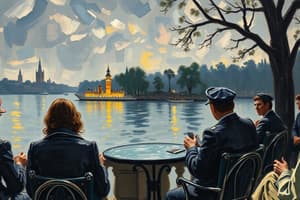Podcast
Questions and Answers
Which of the following is NOT an agent of political socialization?
Which of the following is NOT an agent of political socialization?
- Family
- School
- A U.S. senator (correct)
- Community
How are most attitudes formed?
How are most attitudes formed?
In childhood, based on early childhood experiences.
_____________ political content is given by a media source that lets the reader or viewer know upfront there is a political bias or position.
_____________ political content is given by a media source that lets the reader or viewer know upfront there is a political bias or position.
Overt
Where do your beliefs originate?
Where do your beliefs originate?
Which agents of socialization have the strongest impact on an individual?
Which agents of socialization have the strongest impact on an individual?
The Bradley effect occurs when people ______________.
The Bradley effect occurs when people ______________.
Which of the following is NOT part of a scientific poll design?
Which of the following is NOT part of a scientific poll design?
What do you think of the poll that states Clinton will receive 43% of the vote with an 8% margin of error?
What do you think of the poll that states Clinton will receive 43% of the vote with an 8% margin of error?
Why do pollsters view random people throughout the country when trying to project which candidate will win a presidential election?
Why do pollsters view random people throughout the country when trying to project which candidate will win a presidential election?
How have changes in technology made polling more difficult?
How have changes in technology made polling more difficult?
Why are social politics controversial?
Why are social politics controversial?
Which factor affects congressional approval ratings the most?
Which factor affects congressional approval ratings the most?
Which institution has the highest average public approval ratings?
Which institution has the highest average public approval ratings?
When are social and economic issues more likely to cause polarization in public opinion?
When are social and economic issues more likely to cause polarization in public opinion?
How do polls affect presidential elections?
How do polls affect presidential elections?
Presidential approval ratings ________ over a president's term of office.
Presidential approval ratings ________ over a president's term of office.
Which body of government is least susceptible to public opinion polls?
Which body of government is least susceptible to public opinion polls?
Why would House of Representatives members be more likely than the president to follow public opinion?
Why would House of Representatives members be more likely than the president to follow public opinion?
How does the media use public opinion polls during election season?
How does the media use public opinion polls during election season?
Why might one branch's approval ratings be higher than another's?
Why might one branch's approval ratings be higher than another's?
Flashcards are hidden until you start studying
Study Notes
Political Socialization
- Political socialization agents include family, school, and community; an U.S. senator is not an agent.
- Most attitudes are formed during childhood from early experiences.
- Family has the strongest impact among socialization agents.
Media and Political Bias
- Overt political content informs readers/viewers of its bias or position upfront.
Polling and Public Opinion
- The Bradley effect describes a phenomenon where individuals indicate support for a candidate but vote against them.
- Scientific poll design must avoid leading questions to maintain accuracy.
- High margins of error, such as 8%, may indicate a non-representative poll.
- Random sampling of diverse populations is crucial to avoid bias in polling results.
- Technological changes complicate polling due to various methods and lower response rates in certain demographics.
Social Politics and Public Sentiment
- Social politics can be controversial as they demand a balance of rights and liberties among different groups.
- Domestic events primarily influence congressional approval ratings.
- The Supreme Court typically enjoys the highest average public approval ratings.
Polarization and Issues
- Polarization in public opinion is heightened when economic and social issues present conflicting interests.
Polls and Elections
- Polls help inform voters about candidate-supporting issues, influencing voter behavior in elections.
- Presidential approval ratings generally decline over a president’s term.
- The U.S. Supreme Court is the least influenced by public opinion polls.
Political Accountability
- House of Representatives members are more responsive to public opinion than the president due to frequent elections and campaign fundraising demands.
- Media uses public opinion polls during election season to gauge voter preferences.
Approval Ratings Variability
- Approval ratings may vary between government branches; smaller organizations may find it easier to manage public perception compared to larger ones.
Studying That Suits You
Use AI to generate personalized quizzes and flashcards to suit your learning preferences.




